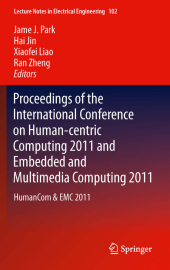 Neuerscheinungen 2013Stand: 2020-01-07 |
Schnellsuche
ISBN/Stichwort/Autor
|
Herderstraße 10
10625 Berlin
Tel.: 030 315 714 16
Fax 030 315 714 14
info@buchspektrum.de |

Hai Jin, Xiaofei Liao, James J. Jong Hyuk Park, Ran Zheng
(Beteiligte)
Proceedings of the International Conference on Human-centric Computing 2011 and Embedded and Multimedia Computing 2011
HumanCom & EMC 2011
Herausgegeben von Park, James J. Jong Hyuk; Jin, Hai; Liao, Xiaofei; Zheng, Ran
Repr. d. Ausg. v. 2011. 2013. xxv, 631 S. 71 Tabellen, 5 Farbtabellen. 235 mm
Verlag/Jahr: SPRINGER NETHERLANDS; SPRINGER, BERLIN 2013
ISBN: 9400737130 (9400737130)
Neue ISBN: 978-9400737136 (9789400737136)
Preis und Lieferzeit: Bitte klicken
Proceedings of the International Conference on Human-centric Computing and Embedded and Multimedia Computing (HumanCom & EMC 2011) will cover topics of HumanCom and EMC, the current hot topics satisfying the world-wide ever-changing needs.
Human-centric computing is to create novel solutions so that the humans are always connected, portable, and available. As with pervasive-computing, human-centric computing requires a variety of devices; however, such devices exist simply to obtain inputs from the human and are embedded in objects that humans interact with on a daily basis. Moreover, during the past couple of decades, Information Science technologies influenced and changed every aspect of our lives and our cultures. Without various Information Science technology-based applications, it would be difficult to keep information stored securely, to process information efficiently, and to communicate conveniently.
Embedded computing ranges from portable devices such as digital watches and MP3 players, to large stationary installations like traffic lights, factory controllers, or the systems controlling nuclear power plants. Complexity varies from low, with a single microcontroller chip, to very high with multiple units, peripherals and networks mounted inside a large chassis or enclosure.
Multimedia computing covers multimedia I/O devices, OS, storage systems, streaming media middleware, continuous media representations, media coding, media processing, etc., and also includes multimedia communications; real-time protocols, end-to-end streaming media, resource allocation, multicast protocols, and multimedia applications; databases, distributed collaboration, video conferencing, 3D virtual environments.


